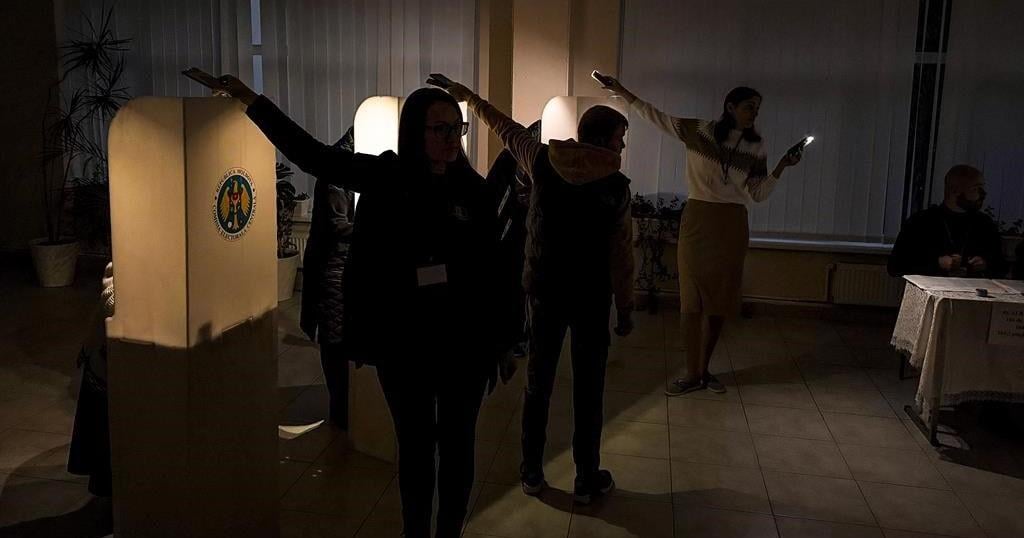CHISINAU, Moldova (AP) — Moldovans are casting ballots in two key votes Sunday that could determine whether the European Union candidate country, which neighbors Ukraine, remains on a pro-western path amid ongoing allegations that Russia has tried to undermine the electoral process.
Incumbent President Maia Sandu is the favorite to secure another term in office in a presidential race in which 11 candidates are running. Voters will also choose “yes” or “no” in a referendum on whether to enshrine in the country’s constitution its path toward the 27-nation EU.
Polls by WatchDog, a Chisinau-based think-tank show a clear majority of more than 50% support the EU path. The referendum needs a one-third turnout to be valid.
Polling stations opened at 7 a.m. (0400GMT) and are expected to close at 9 p.m. (1800GMT). By 4 p.m., more than 1.1 million voters in total — about 39% of eligible voters — had cast ballots, according to the Central Electoral Commission. By 3 p.m., 32% had voted in the EU referendum, nearly passing the validation threshold.
If Sandu fails to win an outright majority on Sunday, a runoff will be held on Nov. 3 which could pit her against Alexandr Stoianoglo, a Russia-friendly former prosecutor general who is polling at around 10%.
The two pivotal ballots are held amid ongoing claims by Moldovan authorities that Moscow has intensified an alleged “hybrid war” campaign to destabilize the country and derail its EU path. The allegations include funding pro-Moscow opposition groups, spreading disinformation, meddling in local elections, and backing a major vote-buying scheme.
U.S. national security spokesman John Kirby echoed those concerns this week, saying in a statement that “Russia is working actively to undermine Moldova’s election and its European integration”. Moscow has repeatedly denied it is interfering in Moldova.
“In the last several months, Moscow has dedicated millions of dollars to influencing Moldova’s presidential election,” Kirby said. “We assess that this money has gone toward financing its preferred parties and spreading disinformation on social media in favor of their campaigns.”
In early October, Moldovan law enforcement said it had uncovered a massive vote-buying scheme orchestrated by Ilan Shor, an exiled pro-Russia oligarch who currently resides in Russia, which paid 15 million euros ($16.2 million) to 130,000 individuals to undermine the two ballots.
Shor, who was convicted in absentia last year to 15 years in jail on fraud and money laundering in the case of $1 billion that went missing from Moldovan banks in 2014, denied allegations, saying “the payments are legal” and cited a right to freedom of expression. Shor’s populist Russia-friendly Shor Party was declared unconstitutional last year and banned.
Constantin Celac, a 37-year-old multimedia producer, said in central Chisinau that he cast his ballots in favor of Sandu and EU integration because “it is the best way” forward for Moldova. He said that while he does have concerns about Russian meddling, “I trust our government … to fight against them.”
On Thursday, Moldovan authorities foiled another plot in which more than 100 young Moldovans received training in Moscow from private military groups on how to create civil unrest around the two votes. Some also attended “more advanced training in guerrilla camps” in Serbia and Bosnia, police said, and four people were detained for 30 days.
Sandu cast her own ballot in the capital on Sunday and told the media that “Moldovans themselves must choose their own fate, and not others, nor the dirty money or the lies.”
“I voted for Moldova to be able to develop in peace and liberty,” she said.
A pro-Western government has been in power in Moldova since 2021, a year after Sandu won the presidency. A parliamentary election will be held next year.
Moldova, a former Soviet republic with a population of about 2.5 million, applied to join the EU in the wake of Russia’s full-scale invasion of neighboring Ukraine on Feb. 24, 2022, and was granted candidate status that summer, alongside Ukraine. Brussels agreed in June to start membership negotiations.
Loredana Godorogea, a 29-year-old IT manager who lives in Chisinau, said she also voted in favor of the incumbent president and the path toward the EU. “I think in the next five years we can be more close economically with the European Union, and I also think a big factor will be the war in Ukraine,” she said.
